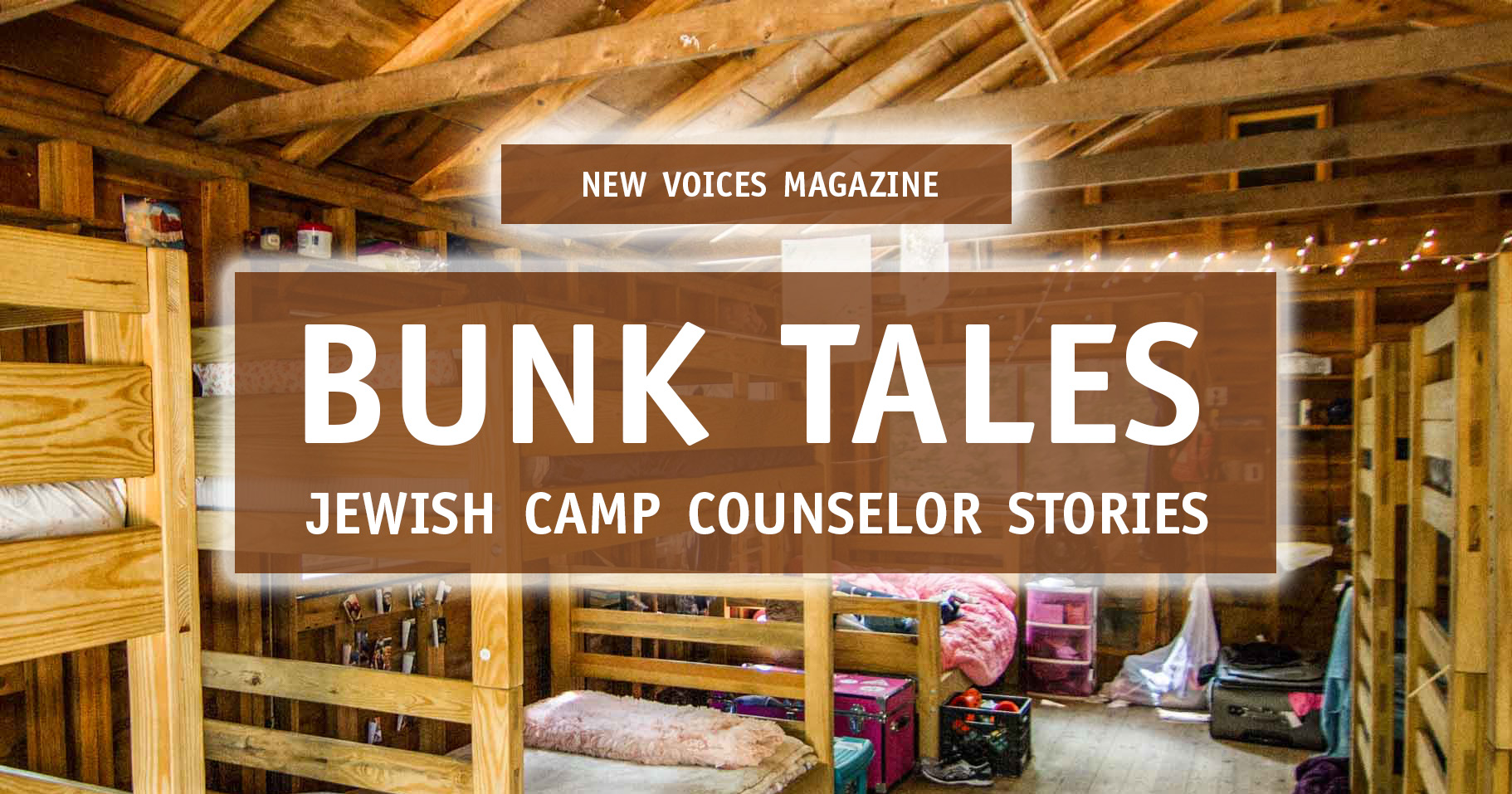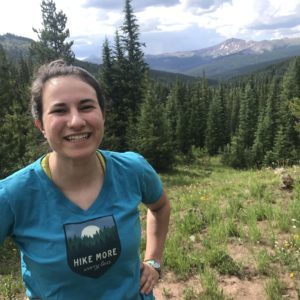For years I spent Saturday summer mornings waking up with a sore throat. Normally, I would frantically text my mom, wondering if I had strep or something far worse—WebMD certainly didn’t help. At camp, however, I welcomed a Saturday morning sore throat with familiar arms. A sore throat meant a Shabbat Shira well spent. If you know what camp Shabbat Shiras are like, nothing more needs to be said. For those of you who have never attended a URJ Camp Kalsman Shabbat Shira, I sincerely hope you someday witness the magic. Until then, allow me to set the scene.
The whole camp is in the dining hall sitting at long rows of jam-packed tables. Heads bop and feet shuffle as we collectively stuff ourselves with a delicious meal of chicken, potatoes, green beans, and homemade challah. Everyone is dressed to the nines—camp version—with their favorite light-colored clothes and freshly showered selves. Layers of dirt and grime give way to silky smooth skin and Chaco-tanned feet as cameras click and guests smile in awe. Campers grab cardigans and water bottles off special white table cloths while counselors latch and push tables to the back left corner. Energy rushes into the space with fervent intention. Microphones and guitars and song leaders appear by the dozen as bodies smush together. The room buzzes with excitement. With a gulp of water and a deep breath, the beautiful chaos begins.
For the next 30 minutes, nothing else matters. Singing and dancing fill the dining room, walls pulsing and heart racing. The songs are both Jewish and not Jewish. They are familiar and foreign, diasporic and Israeli, English and Hebrew and a healthy dose of gibberish. Some relate to Shabbat explicitly while others have nothing to do with the day of rest at all. Dance moves roll off bodies, and words come flying out of parched mouths as we go from one song to the next and next and next in rapid fire succession. When it is over, I feel like I just completed a marathon. Shabbat Shira is crossing the finish line with your favorite people in your favorite place. Gasping for air and waiting in line at the water jugs, we are the best version of happy-exhausted.
Shabbat Shira may not look so magical to outsiders. It’s actually just 200 kids, teens, and camp-loving adults singing at the top of their lungs and jumping around in a sweaty, off-key mess. In any other situation, you’d find me sitting on the sidelines, protecting the public from my horrific dance moves and exceptionally tone deaf voice. But at camp, things are different. I am different. It feels impossibly hard to pinpoint just what makes this place and time so magnificent. Many say it’s the community, and they are not wrong. The Jewish camp community is incredible, and my experiences would never be the same without it. And yet, the sacred ambiance is more than that. No amount of Jewish geography or innovative mixer questions or cabin bonding activities can account for the magnitude of wonder on its own. Rather, it is the impossibly rare alignment of hundreds of tiny moving parts.
I never expected to become more Jewish as I became less religious, nonetheless while at Jewish summer camp. Yet looking back (perhaps unsurprisingly), camp was the perfect catalyst. Camp allowed me to embrace a more cultural and less religious Jewish identity without discrediting my Judaism. Camp not only allowed but encouraged me to grapple with the hitherto impossible task of recognizing religion and culture as simultaneously overlapping and distinct. My summers here gave me every opportunity to openly question, negotiate, and redraw the boundaries of what I knew to be true. Before camp, I did not even know it was possible to proudly identify as culturally Jewish without being particularly religious. To me, religiosity often correlates with rigidity: rules, specifics, and memorization. Culture, meanwhile, means tradition and history and food and community. Others see it differently, and I love that. These two aspects of Judaism inevitably overlap, and for some you cannot have one without the other. For me, however, Judaism is about reading between the lines to adopt what you love while leaving the shoes that don’t fit.
Camp is the essence of this culture. Kalsman is the place where I both learned and role-modeled the power of grounding myself in a Jewish community that actually means something to me. In the world of summer camp, living and learning exist far beyond the notion of Judaism as traditional religion exclusively. Camp is the place that reassures me services can be magical even and especially when I do not know or believe every word I am saying. Camp is the place where being Jewish is just as much about the spaces we create as the histories and words we carry. Camp is the place that allowed me to figure out what progressive, inclusive, activist-oriented Judaism means to me. As a counselor, camp is where I can embody and share my love for finding my place in this messy world of intersecting identities and ideologies. Camp is where I realized, at 18 years old, that Shabbat Shira is my kind of Judaism.
Knowing this, I find witnessing and partaking in shira as a staff member even more magical than I did as a camper. Sure, the songleaders changed and tunes evolved, but the essence of Shira remained. While camp Shabbats stayed constant, my perspective changed. There’s something intangibly beautiful about seeing campers you never expected to dance take center stage, grabbing their friends and tugging them along. Watching them inevitably bewilders me, and at the same time it is not at all surprising. I see myself in these campers, and I wonder if maybe camp will be their catalyst, too. As a counselor, cultivating space for the wondrous and unexpected is what it’s all about. It’s what keeps me coming back.
It has been a while since I celebrated Shabbat Shira at camp, and I miss it. Still, the images—Portland tweens and Seattle teens and Polish and British and American and Israeli and Hungarian and Canadian staff singing their hearts out in languages familiar and foreign, skipping around with friends and strangers turned best friends, busting moves in sync or at random without blinking an eye—remain starkly etched in the crevices of my mind. Finding my place in this global network of people and identities reminds me just how much room there is under the umbrella of Judaism.
I do not entirely know what Jewish culture and religion will look like for me in the future. However, I know that being a counselor at Kalsman made me into the Jew I am today. Shabbat Shira may never again be my most recent Jewish experience, yet its impact continues to ripple. Regardless of how the world goes, summer camp Shabbat Shira will always be my foundation—front, center, and crazy as ever.
Click here to read more Bunk Tales stories or click here to visit the Bunk Tales Project landing page.

